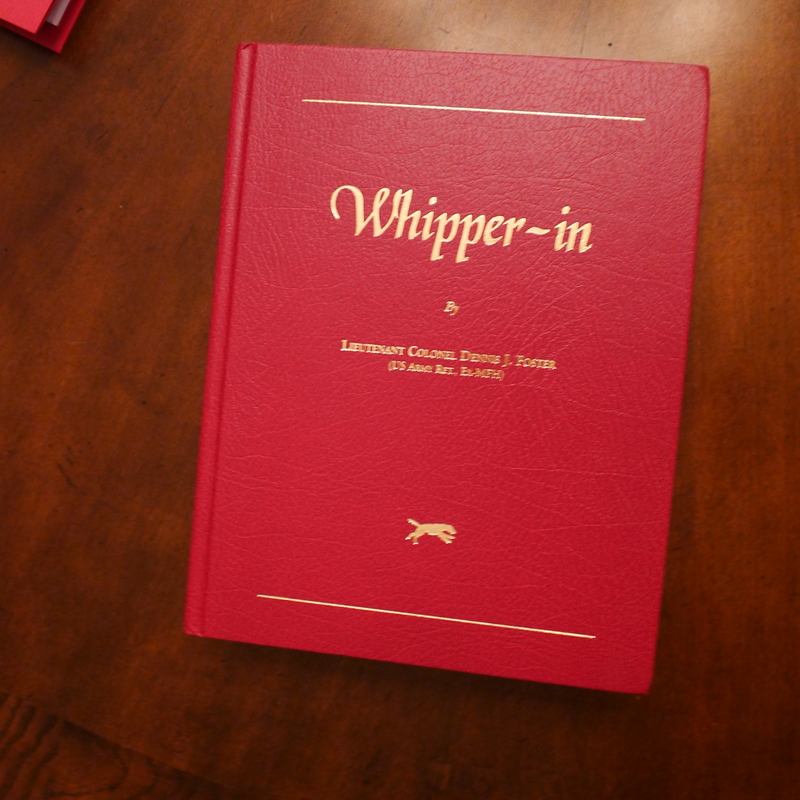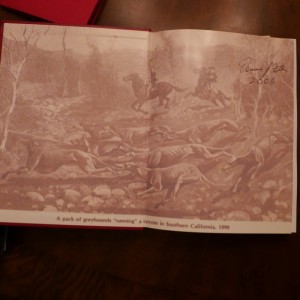From Dennis Foster’s Whipper-In: “All new whippers-in want specific answers to all their questions. Where should I go? What do you want me to do? Most of the time there is no clear answer. No answer is the answer … then you realize that you’re on the road to success.
“Then there are the whippers-in the field hardly ever sees, those who do not halloo the fox, who quietly bring up the stragglers or return the portion of the pack that split on the non-hunted fox. These are the ones who see what needs to be done and do it quietly despite their desire to stay with the hunted fox. These whippers-in are, most certainly, doing the job for the right reason.
“Whipping-in is tough on both rider and horse. It requires considerable time, concentration, and a strong commitment to the hunt and the huntsman. Ironically, if whippers-in do their job right, they often miss all the action. They must bring hounds forward that have been left behind, or stop the hounds that have split off or on the wrong quarry, or guard an unsafe area to assure hounds don’t go there. Often, because whippers-in usually cover an area or specific side of the pack, they can miss a chase that exits the other side.
“To the casual observer the whipper-in is the forlorn figure mounted on a rawboned horse in the most exposed angle of a rain-slashed landscape. There he crouches–his jaundiced eye upon the angle of the dripping covert, a succession of cold drops vacating his frigid nose, a hopeless hedge and ditch before him and a fox just sneaking out of the bracken.
“The whipper-in watches the fox out of the corner of his eye. Nothing moves except the continuous procession of drops from the tip of his nose. The fox pauses an instant, one delicate foot upraised, the perfection of agility, balance, and the eternal spirit of an English winter. The whipper-in has a greater personal experience of a fox at that dramatic moment than all the poets, naturalists, humanitarians, and other sensitive souls in Christendom. But he is not a poet or a naturalist–he is a whipper-in. And even a humanitarian confronted by that drenched and incorruptible thorn hedge would turn aside and weep a tear for a hunt servant with so much wear and tear dependent upon so small and energetic an objective.
“The whipper-in stares drearily at the fox which, satisfied that hounds are approaching, reaches the hedge–that ruthlessly made hedge–and twitching his brush is off like a wind-spun red leaf for Cobblers Copse.
“Instantly the whipper-in is galvanised. He raises himself in his stirrups. (The rain now pours from his coat upon his saddle.) He thrusts a finger in his ear (because that is traditional and whippers-in are die-hards to a man). He opens his ugly disillusioned jaw. He emits with the full force of his lungs a piercing and electrifying ‘holloa!’”
Lessons Learned by a Rookie Whip
By Mark Thompson, Whipper-In (Hon.)
First lesson, never refer to oneself as a “whip”—it’s should always be the more formal “whipper-in.” You see, the emphasis is really on being “in” (as in, “in the right spot”) not on the “whip” (as the whip is rarely, if ever used, if you are in the right spot). And, “in” doesn’t really mean “in,” sometimes it means “out,” or “in between” or wherever the huntsman imagined you were supposed to be, but weren’t. Not to worry, you’ll hear about it, no matter the spot. If you don’t learn where to, and learn it quickly, you may begin to see your title, at least as heard under your huntsman’s breath, is no longer “lady” or “gentleman,” nor even “whipper-in,” but a curse-word instead.
Second lesson, whippers-in don’t worry about having titles, not that they go looking for a bad one, they just don’t go looking for a good one either. They just look to go hunting. If they worried about titles, they would never have agreed to undertake a position such as this one, which requires real work.
Third lesson, learn to “talk less and ride more.” The first time I was given this instruction was while whipping-in on a joint meet with many visiting staff, who received the customary invitation to ride up with hounds. The mixed pack of hounds from three different hunts went in three different directions, in front of a dozen staff from all of the hunts. The first sub-pack of hounds started to run a jack rabbit to the north. The second sub-pack stayed with the huntsman and wondered what all the babbling was about. The third sub-pack started to give tongue on the tracks of a herd of one-hundred antelope which could be seen on the horizon. I was the nearest whipper-in to the front of the pack (the ones starting on the antelope tracks) and I looked back a hundred yards back towards the huntsman. He was galloping on with the main part of the pack with him, trying to catch up to the hounds that we nearest me. I continued to look back and could only make out the glimpse of a grimace on the huntsman’s face. Arriving at the top of the hill, I pulled my horse up and stopped to look and see if I was missing unseen quarry in the distance, between us and the antelope. As he caught up to within shouting distance, the shot came, “God damn it, stop them, don’t sit there.” Yet, in those few seconds of waiting, the front of the pack had already well passed me by, and it was now real work to gallop down the hill and through the treacherous bottom of the ravine, to attempt to catch the lead hounds, which were now going nearly as fast as a Thoroughbred horse can go. About a mile later, I succeeded in getting to the front of the pack and stopping the hounds. The huntsman was none too happy about this two-mile stint and looked around to make sure no one was within earshot. He said under his breath, “With all of this staff out, you’d think somebody would do something,” he muttered before any of the field had caught up to us.” He caught his breath and then looked to me, “Why didn’t you stop them sooner?” I asked back, “I was waiting for you; why didn’t you blow try back?” This relieved the tension made us both laugh as he replied, “’cause these hounds wouldn’t have known a try back if they heard one.”
Fourth lesson, a good huntsman never criticizes in public. In fact, it is always done out of earshot of anyone else. This is true whether he is speaking to a hound, an honorary whip, a hired hunt servant, and probably, his wife, his car mechanic or his worst enemy. I have met more than a fair share of huntsmen now, a term which also obviously includes women, and they are all the same in this regard. I haven’t heard one gossip about any person, hound or thing, nor have I heard them utter a public criticism of a staff member.
Fifth lesson, take your private criticisms as constructive feedback, as if they came from a battlefield general, especially if they come in the heat of battle. If you have ever raised a “‘unting dawg” as Surtees liked to call them, you know some are good, some are bad, some are easy and some are hard. The bad and the hard ones worry you the same or more as the good and easy ones. They all become like children and it pains any staff to lose one, even if it’s only lost for a minute, and even if it’s not your favorite. I have slept under a tree waiting for a hunting dog to return, after losing him during a day afield. Luckily he returned. Every huntsman I know would do the same thing upon losing a hound. So it is much like the “leave no man behind” motto of our Marines, any huntsman feels the same responsibility towards his or her hounds. And, if a general yelled at you because he was worried about his troops, you wouldn’t take it as anything but a compliment that he was concerned about his troops, which again includes you. Taken in that light, whether on the battlefield or hunt field, criticisms are really words of wisdom and love meant to keep you from getting your ass shot off, the next time you make a stupid mistake. Further, if the huntsman is like a father figure, it’s even easier to take any comments as just good advice for surviving to old age, in spite of your rookie mistakes.
Sixth lesson, there are no mistakes, only lessons. I think the Dali Lama said this and while he isn’t a hunting man, he could teach us all everything we need to know about whipping-in. He’s quite. He’s unassuming. He always wear the same uniform and it’s in good shape. He doesn’t have any jewelry. He wears his hair short. He likes being of help to others more than he is concerned with himself. And, he has a good sense of humor and his shoes are always shined.
Seventh lesson, invest in stock in a shoe polish company. You’ll be going through plenty of it. Along with brass polish for buttons, silver polish for bits and spurs, tack polish for tack, hair polish for manes, etc. You really have no idea of the quantities necessary, until you attempt to turn out for 70 days of hunting. I have it on good authority that it’s about 25 jars of polish. Alternatively, my English pals assure me that you can actually wear out a deer bone, so acquire several at the outset.
Eighth lesson, you can wear out a hunt coat. An old huntsman saw me trying on a second-hand coat at auction and said, “You should get that scarlet coat, it fits you well.” I replied, “I already have one this same weight that I like better.” He said, “Yes, but your young and you’ll wear one out every 15 years. You might as well be prepared and it’s a good price. “
Ninth lesson, be prepared. Be prepared with more horses than you need, a more patient spouse than you think you’ll need, an extra pair of gloves, more shoe polish than you’ll need for the entire season, a spare bridle, an extra saddle, a spare stirrup strap, a plan for a rainy day, and a space blanket to spend the night under a tree waiting for hounds, if that’s what it will take to bring all of the hounds home.
Tenth lesson, if you don’t bring all the hounds home at least die trying.
Repeat lessons one through ten, until all lessons are learned.



Leave A Comment
You must be logged in to post a comment.